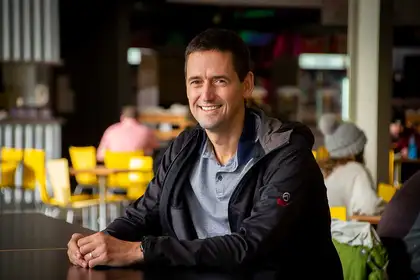
Professor Martin Berka.
The new head of the School of Economics and Finance wants the Massey Business School to be the “default provider” of innovative high-quality education in economics, finance and property studies at all levels in New Zealand.
Professor Martin Berka, whose expertise is in applied macroeconomics, says the school is already well-placed in terms of research rankings. Its finance research ranked in the world’s top 200 in QS Rankings and in the top 150 in Shanghai Ranking's Global Ranking of Academic Subjects, which places Massey in top place in New Zealand. The business school’s economics research also ranked in the world’s top 250.
Future-focused vision
Professor Berka has a future-focused vision to ensure the school’s programmes become more relevant for graduates and address the important topics of our time.
“I think the key opportunities lie in our good local and international presence and our ability to offer innovative programmes that reflect our ever-changing world – whether that’s examining the causes of growing inequality, understanding the local and global economic and financial landscapes, or rigorously analysing the effects and opportunities of climate change,” he says.
“Priorities for me include strengthening our research, improving our teaching and offering programmes that are more relevant to the market needs. In the end, the rankings which drive a lot of our international demand are based on our research performance, and we need to continue improving on that front.
“We also need to build clear pathways from our programmes to employment, in part by engaging our substantial alumni networks in meaningful ways. That in itself requires programmes that are of value to society.”
Using data to improve economic models
Professor Berka received his PhD from the University of Bristish Columbia in 2005 and joined Massey shortly after. He then worked at Victoria University of Wellington and the University of Auckland before returning to Massey as an associate professor in 2017. He was promoted to professor in 2018, following publication of a research article in the American Economic Review.
His research interests focus on using large and informative datasets to determine what drives prices in various economic interactions.
“In economics, prices serve as signals that moderate the interactions between people, firms and governments,” Professor Berka says. “ In theory, if prices reflect all costs and benefits to society, unregulated markets deliver socially optimal outcomes. This is a fundamental principle of economics.
“Of course there are numerous reasons why prices, in reality, do not reflect all social costs and benefits as theories assume they should. My work aims to improve theories by using large, detailed datasets to identify reasons why economic paradigms may not hold and in turn, understand just how much, and why, the prices we do observe in market interactions are not ‘right’.”
His current research projects include using big data from newspapers and social media in China to understand how expectations around real estate prices are formed; using historical price data for hundreds of goods and services in Japan to study the impact technical innovations have on relative prices; and developing a theoretical model of economic growth for New Zealand’s regions.
Ready to tackle any challenges
Professor Berka is looking forward to bringing his skills to the role of head of school and says he will be focused on articulating a shared vision for the school’s staff.
“I treat everyone with respect and will support my colleagues to reach their aspirations,” he says. “I prefer to form and support teams, rather than micro-manage, and most importantly, when it comes to facing challenges, I do not give up easily.”